Overview
To determine if 1400 calories a day is enough for you, one must consider factors such as age, gender, activity level, wellness goals, and potential medical conditions. The article emphasizes that while 1400 calories can be effective for weight loss, it is crucial to ensure nutritional balance and monitor energy levels to maintain overall health and cognitive function.
Introduction
Navigating the world of diets can often feel overwhelming, especially with the myriad of options available. Among these, the 1400-calorie diet stands out as a popular choice for those aiming to achieve weight loss or maintain a healthier lifestyle.
However, determining if this dietary approach is right for an individual involves a careful assessment of personal factors such as:
- Age
- Activity level
- Health goals
This article delves into the intricacies of the 1400-calorie diet, offering practical strategies for:
- Meal planning
- Understanding health implications
- Balancing macronutrients
By empowering oneself with knowledge and mindful practices, it becomes possible to embrace this dietary journey with confidence and clarity, ultimately leading to enhanced well-being and vitality.
Is a 1400-Calorie Diet Right for You?
Determining if 1400 calories a day is enough for you involves a nuanced evaluation of various factors.
-
Age and Gender: Younger individuals and men typically require more calories due to higher metabolic rates and greater muscle mass. As metabolism slows with age, caloric needs can decrease, making it essential to tailor dietary consumption accordingly.
-
Activity Level: Your daily activity level plays a crucial role in caloric requirements. For individuals with sedentary lifestyles, the question of whether 1400 calories a day is enough may suffice, while those who are more active may require additional calories to sustain their energy and performance.
-
Wellness Objectives: It’s vital to consider your specific wellness aims. If your goal is weight loss, you might ask, is 1400 calories a day enough, considering that a 1400-calorie diet can be effective, especially since a daily consumption of 1,200 calories or less is generally regarded as insufficient for healthy adults. However, it’s equally important to ensure that this plan aligns with your overall health aspirations, whether they involve maintenance or muscle gain.
-
Medical Conditions: Always consult with a healthcare professional if you have any medical conditions that may influence your dietary needs. Their guidance can help you craft a plan that is both safe and effective.
-
Cognitive Function: It's important to recognize that the brain consumes around 20% of the metabolic energy derived from food. This underscores the necessity of adequate caloric intake for maintaining cognitive function, particularly when considering a reduced-calorie diet.
-
Nutritional Context: The American food consumption is often characterized by high levels of processed sugars and saturated fats, leading to malnutrition and increased risk of chronic diseases. Transitioning to a more balanced eating plan is crucial to fight preventable illnesses like diabetes and heart conditions.
By thoughtfully evaluating these factors, you enable yourself to make a knowledgeable choice about whether 1400 calories a day is enough for your lifestyle and health goals. Remember, your choices not only affect your own well-being but can also set a positive example for those around you.
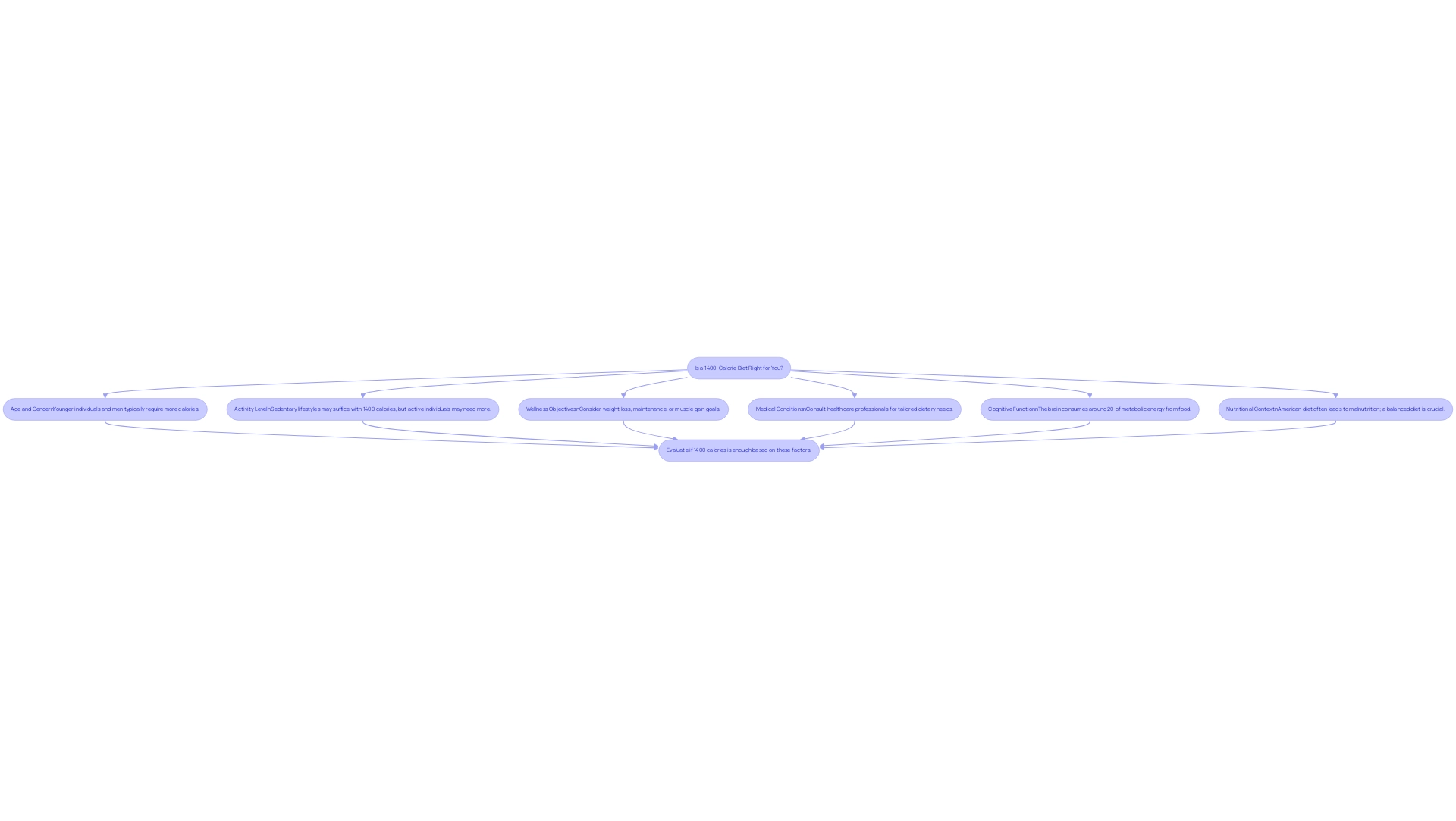
Effective Meal Planning for a 1400-Calorie Diet
To successfully navigate a 1400-calorie diet while ensuring nutritional needs are met, consider the following strategies:
- Create a Weekly Menu: Craft a detailed menu for the week, incorporating a diverse array of foods. This not only ensures you meet your nutritional needs but also keeps dishes exciting and satisfying. For instance, a balanced breakfast could consist of 1 cup of all-bran cereal, 1 cup of skim milk, and 1 medium banana, totaling 349 calories.
- Use a Calorie Tracking App: Leverage technology by utilizing apps such as MyFitnessPal. These tools simplify tracking your daily caloric intake, empowering you to maintain your calorie limits effortlessly. As mentioned, "To determine if 1,400 calories a day is enough, organize your foods and snacks thoughtfully to guarantee you fulfill your nutritional requirements while remaining within the calorie restriction."
- Focus on Whole Foods: Emphasize the consumption of fruits, vegetables, lean proteins, whole grains, and healthy fats. These nutrient-dense options not only support your health but also promote satiety, helping you feel fuller for longer.
- Pre-portion Snacks: Take charge of your snacking by preparing and portioning healthy snacks in advance. Opt for nutritious choices like nuts, yogurt, or sliced vegetables to avoid the pitfalls of mindless eating.
- Stay Flexible: Embrace a mindset of adaptability in your food planning. Allowing for occasional treats or adjustments can sustain your motivation and prevent feelings of deprivation or burnout.
It's important to consider whether 1400 calories a day is enough for everyone, particularly for those with disordered eating habits. By applying these strategies, you can develop a sustainable food plan that not only achieves your caloric objectives but also improves your overall well-being and wellness. Remember, careful meal planning and mindful eating are crucial to achieving long-term success on a low-calorie eating plan.
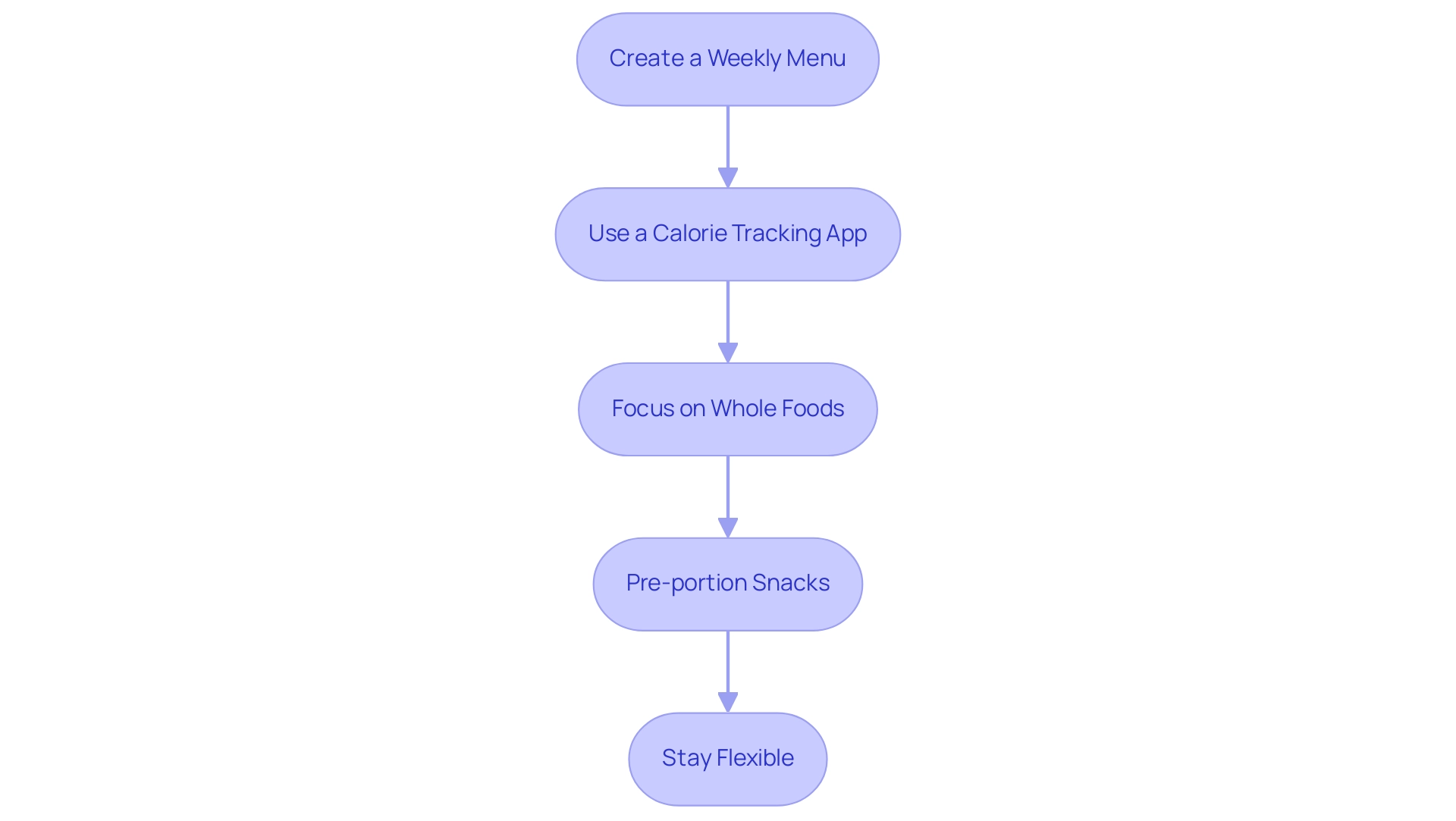
Understanding the Health Implications of Eating 1400 Calories
Adopting a 1400-calorie diet can carry various health implications that warrant careful consideration:
- Metabolism: A significant reduction in caloric consumption can lead to a slowdown in metabolism, complicating weight loss efforts over time. Recent studies indicate notable improvements in insulin sensitivity—up to 40% in those practicing caloric restriction—underscoring the need to monitor how your body adapts to dietary changes. Interestingly, populations such as the Okinawans, who maintain a low caloric consumption, have shown remarkable health outcomes, suggesting that the quality of calories consumed plays a critical role in metabolic health.
- Energy Levels: Individuals on low-calorie diets often report feelings of fatigue or decreased energy. It's essential to listen to your body and make adjustments to your caloric intake if you experience persistent fatigue, as maintaining energy is crucial for overall performance and productivity.
- Nutritional Deficiencies: To prevent deficiencies in vital nutrients such as vitamins, minerals, and proteins, it's imperative to ensure that meals are nutritionally balanced. Real-world examples demonstrate that individuals on a strict meal plan often wonder if 1400 calories a day is enough to fulfill their nutritional requirements, which can result in negative well-being outcomes. The findings from the case study titled "Clinical Implications of Diet Composition" suggest that simply reducing caloric intake without addressing carbohydrate levels may not be sufficient for effective weight loss and metabolic improvement, indicating a need for a balanced approach.
- Mental Health: Caloric restriction can also influence mood and cognitive function. Understanding how your food selections affect your mental well-being is vital, as a balanced nutritional intake plays a crucial part in sustaining emotional wellness. Sumithran et al. (2011) reported long-term persistence of hormonal adaptations to weight loss, highlighting the importance of understanding these effects on mental wellness and overall well-being.
For those navigating the complexities of a low-calorie eating plan, consulting with a healthcare professional or nutritionist can provide tailored advice to ensure that your dietary practices align with your health goals and sustain overall well-being. By prioritizing nutritional balance and monitoring energy levels, you can enhance your performance and promote a healthier lifestyle.
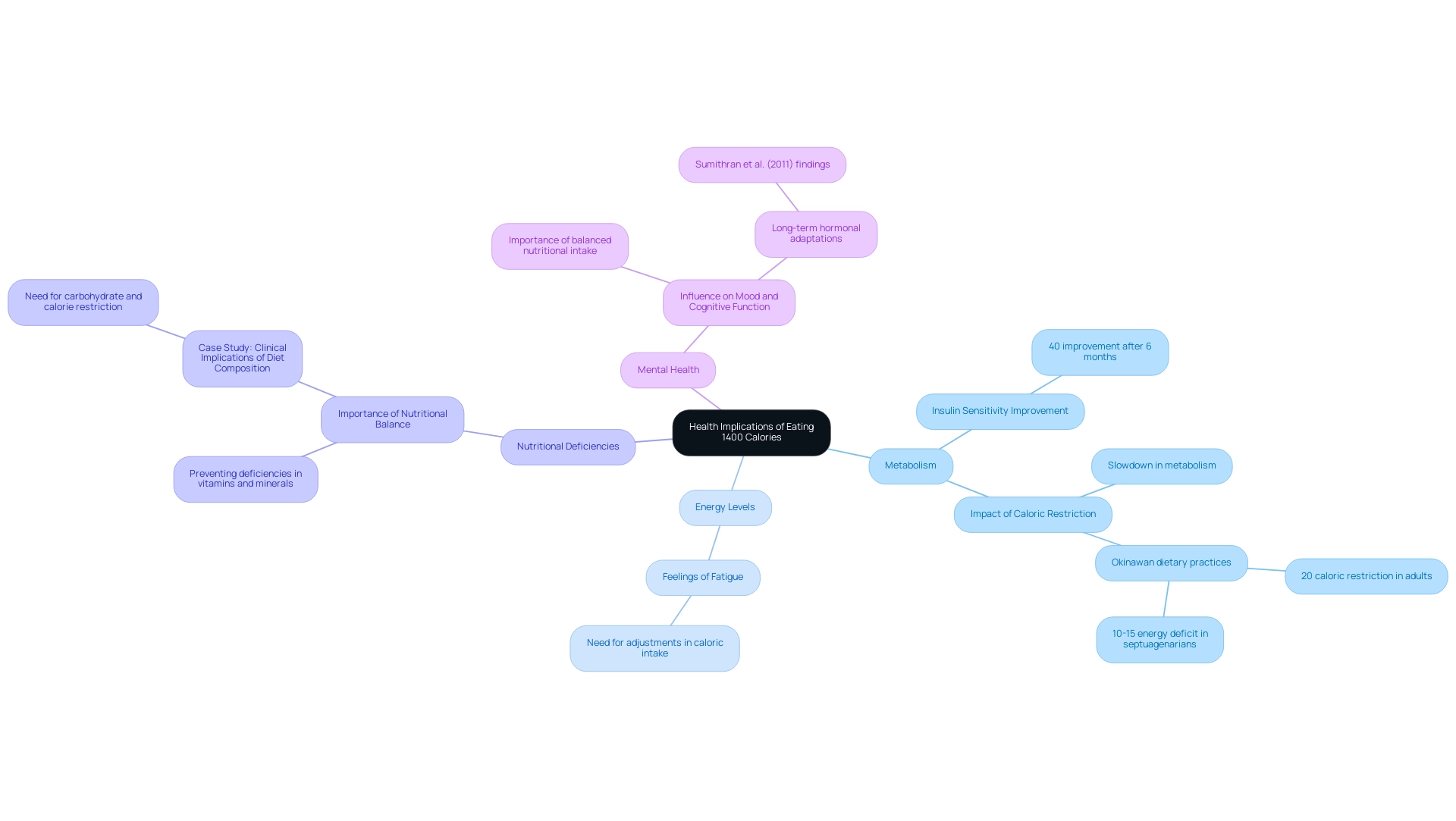
Balancing Macronutrients on a 1400-Calorie Diet
To effectively balance macronutrients on a 1400-calorie meal plan, follow these empowering steps:
- Calculate Your Needs: Begin by determining the percentage of calories you wish to allocate to carbohydrates, proteins, and fats. A widely recommended ratio is 50% carbohydrates, 30% protein, and 20% fat, ensuring a well-rounded intake that supports your daily activities. For instance, Jason's off day macronutrients include 95 g of fats, 289 g of carbs, and 341 g of proteins, which can serve as a reference for your own distribution.
- Choose Quality Sources: Focus on selecting whole, unprocessed foods that nourish your body. For carbohydrates, opt for wholesome grains and vibrant fruits; for protein, consider lean meats, legumes, and dairy options; and for fats, include healthy choices like avocados, nuts, and olive oil. Quality matters, and these sources contribute significantly to your overall wellness.
- Monitor Portions: Precision is key. Use measuring cups or a food scale to ensure you're consuming the appropriate amounts of each macronutrient. This practice not only helps in adhering to your dietary goals but also enhances your awareness of food intake.
- Adjust as Needed: Listen to your body. If you find yourself feeling sluggish or unsatisfied, don't hesitate to adjust your macronutrient ratios. Customizing your nutrition to better meet your individual needs can lead to enhanced energy levels and overall satisfaction. Remember, your baseline BMR calories would be 2185, as noted by Steven, emphasizing the significance of comprehending your caloric requirements.
By prioritizing macronutrient balance, you create the foundation for increased energy and improved health, all while questioning if 1400 calories a day is enough. Lee's journey illustrates the effectiveness of monitoring and adjusting your intake; he started at 180 lbs and lost 17 lbs by doing just that, ultimately leading to significant improvements in body composition and performance. It's not just about the numbers; it's about how you feel and thrive.
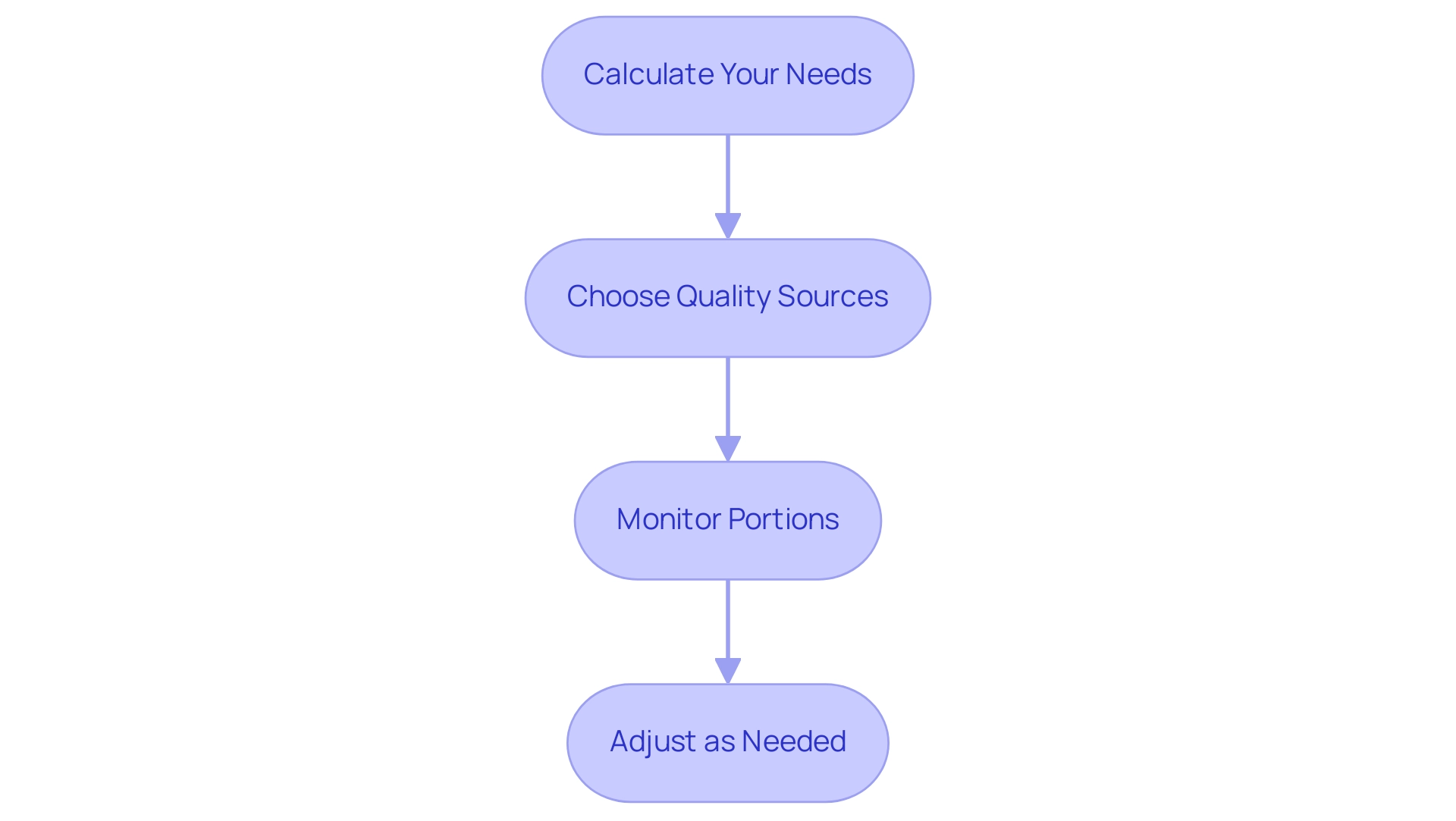
Overcoming Challenges on a 1400-Calorie Diet
Successfully navigating the challenges of a 1400-calorie diet raises the question of whether 1400 calories a day is enough, and requires strategic planning and a positive mindset. As Kimberly Gomer, a dietitian at Pritikin, notes, "If you’re scratching your head right now, confused about what we’re talking about, you’re not alone." Here are key strategies to help you stay on track:
- Address Hunger: Incorporate high-fiber foods such as vegetables and whole grains into your dishes. These options are not only nutritious but also promote a sense of fullness, allowing you to manage hunger effectively.
- Stay Hydrated: It’s crucial to recognize that thirst can often masquerade as hunger. By drinking ample water throughout the day, you can ensure proper hydration, which plays a vital role in weight loss and overall health.
- Plan for Social Situations: Anticipating social events can help you maintain your dietary goals. Preparing your dishes in advance or bringing healthy snacks can help you resist temptation and stay committed. Research shows that a controlled baseline diet provided at 1.5× RMR can help maintain energy balance, reinforcing the importance of planning.
- Seek Support: Joining a support group or partnering with a friend who shares your dietary aspirations can significantly enhance your motivation. Sharing experiences and strategies fosters a sense of camaraderie and accountability.
- Be Kind to Yourself: It’s important to approach your journey with compassion. If you encounter setbacks, acknowledge them without harsh judgment. Refocusing on your goals with a positive mindset will help you maintain your commitment to a healthier lifestyle.
Furthermore, consider the findings from the case study titled 'Behavioral Changes Linked to Timing of Consumption,' which explored how timing of consumption influences appetite and subsequent calorie intake. The study suggested that larger morning meals may enhance weight loss success through behavioral adaptations, highlighting the importance of meal timing in your dietary strategy.
By implementing these strategies and insights, you can effectively manage the hurdles of a 1400-calorie diet while evaluating if 1400 calories a day is enough to reinforce your dedication to personal well-being and a healthier life.
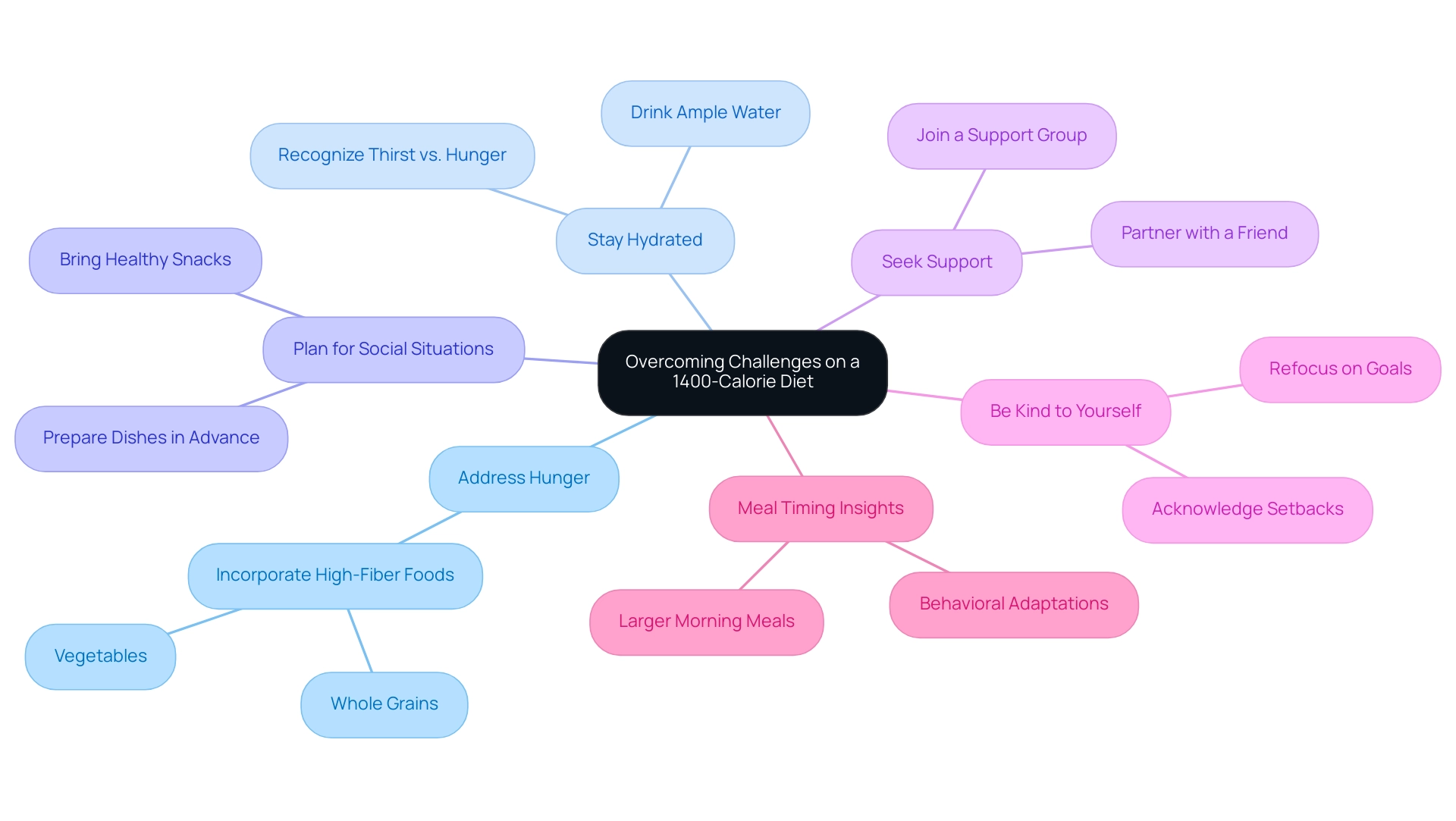
Conclusion
Embracing a 1400-calorie diet can be a transformative journey towards achieving personal health goals, but it requires thoughtful consideration of various factors. From evaluating age, activity levels, and health objectives to understanding the implications of caloric intake on metabolism and energy levels, each element plays a crucial role in the success of this dietary approach. Meal planning, balancing macronutrients, and recognizing the importance of quality food sources are essential strategies that empower individuals to meet their nutritional needs while staying within calorie limits.
Moreover, overcoming challenges such as:
- Hunger management
- Hydration
- Social situations
underscores the significance of strategic planning and support. Taking a flexible approach to meal preparation and being kind to oneself during setbacks can foster resilience and commitment. This journey is not merely about cutting calories; it’s about cultivating a sustainable lifestyle that promotes well-being and vitality.
Ultimately, by equipping oneself with knowledge and practical strategies, the 1400-calorie diet can serve as a stepping stone to a healthier life. Prioritizing nutritional balance, staying mindful of energy levels, and seeking guidance when needed will pave the way for lasting success. The path to improved health is within reach, and every small action taken today can lead to significant benefits for tomorrow.




